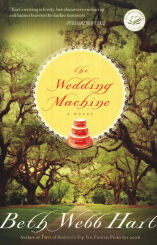|
 The
Wedding Machine tells the story of four Southern matriarchs
in the low-country town of Jasper, South Carolina, who take great pride
in ensuring that every local bride is married in the highest of
Southern style. Ray, the practical organizer, Kitty B, the food
specialist, Hilda, the wealthy blue blood, and Sis, the meticulous
adherent to detail, are known as the Wedding Guild, or “the gals.”
Pooling their abundant resources of fine china, linens, antique
knickknacks, Southern Living recipes, and knowledge
of old-fashioned Southern etiquette, they can turn the wedding of any
unlikely couple into a grand festivity of Southern pomp and flair,
complete with gardenia and magnolia blooms and a decorated statue of a
little girl who adorns every ceremony—fondly referred to as “Miss C.” The
Wedding Machine tells the story of four Southern matriarchs
in the low-country town of Jasper, South Carolina, who take great pride
in ensuring that every local bride is married in the highest of
Southern style. Ray, the practical organizer, Kitty B, the food
specialist, Hilda, the wealthy blue blood, and Sis, the meticulous
adherent to detail, are known as the Wedding Guild, or “the gals.”
Pooling their abundant resources of fine china, linens, antique
knickknacks, Southern Living recipes, and knowledge
of old-fashioned Southern etiquette, they can turn the wedding of any
unlikely couple into a grand festivity of Southern pomp and flair,
complete with gardenia and magnolia blooms and a decorated statue of a
little girl who adorns every ceremony—fondly referred to as “Miss C.”
However, despite their love of
weddings, the gals have been less than successful in pulling off happy
marriages. Each one harbors a dark secret that has spilled a nasty
stain on their image as the perfect Southern lady married to the man of
her dreams. As the summer approaches and Kitty B, Hilda, and Ray’s
daughters seek to tie the knot with their intendeds, the secrets
unravel and the Wedding Guild comes to a shaky stop. Little Hilda
marries an influential Italian, Katie Rae battles pre-wedding jitters,
and Priscilla rejects the proposal from an upstanding doctor and elopes
to Las Vegas with a reality show wannabe.
But it is when Hilda’s
ex-husband announces his marriage to the local manicurist that
everything comes to a major standstill. The most tormented of them all,
Hilda secludes herself in her grand house, communicating with the
outside world only through notes passed from the gals through her mail
slot. And yet, as she remains locked away, the other ladies gain the
courage to face their pasts and come to terms with their lives. Ray
acknowledges
|
her
illegitimate heritage, Kitty B casts off the blame for
her baby’s death and her husband’s mental illness, and Sis lets go of
her love for the fiancé who died long ago in Vietnam—the wedding dress
that has hung in her closet all these years is finally donated
to
Goodwill. Only Hilda keeps her secret tucked away in the deep recesses
of her heart.
Much
Southern humor abounds to assuage the darkness of the story,
particularly when it comes to Hilda and Sis. The heart of the novel
lies with these two ladies, even though Ray is the clear leader of the
pack. Sis, the only one unmarried, is youthful, perky, and happy,
despite holding on to a love that was never meant to be, while Hilda,
the former beauty, sinks into a pit of loneliness, depression, and
despair as she waits for her husband to return to her. But like Sis’s
dead lover, he will never return and everyone knows it. Her secret has
created a barrier of guilt and shame that no one can cross, not even
her own children.
Holding to many of the classic
elements of a Southern tragedy, this story could be played out well in
a film: beyond the beauty of live oaks and Spanish moss and the silly,
fun-loving foibles of the local Wedding Guild, dark sins and secrets
eat away at the soul. Being a Southerner myself (I hail from eastern
North Carolina), I love seeing this mixture of humor and horror because
it rings so true. Behind every hilarious euphemism or twangy expression
is a hidden closet in an old Southern home or a musty, wooden hope
chest where mysteries of blackness will never be fully known or
discovered—which is why Southern stories are so intriguing to
Hollywood. Like Steel Magnolias (a favorite of
mine), I could see a group of mature A-list actresses clamoring over
these roles—actresses such as Kathy Bates, Susan Sarandon, and of
course, the great Meryl Streep.
And like that movie, the story
leaves the reader with a small glimmer of hope: Ray, in all of her
wisdom and practically, buys Sis’s wedding dress from Goodwill and
helps put on the ultimate Jasper wedding. Hilda is coaxed out of her
cocoon, and for a brief moment, the gals are together again, content
and happy. It is the classic “perfect ending” to a good, Southern tale.
|









